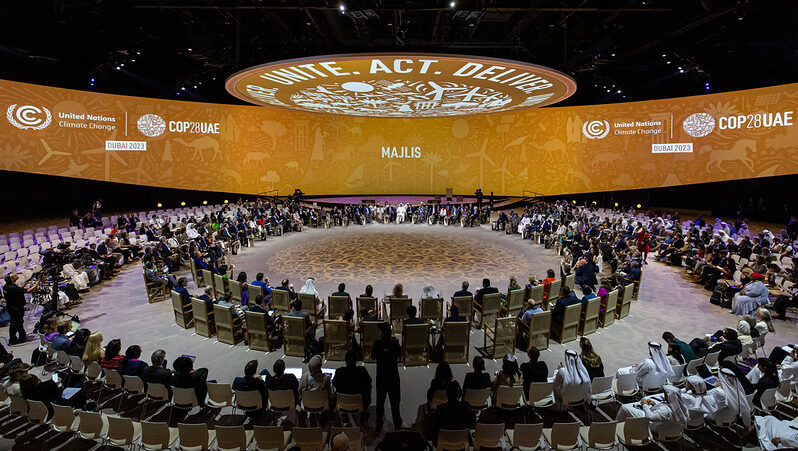Sign up to get our weekly newsletter straight to your inbox, plus breaking news, investigations and extra bulletins from key events
For those who want Cop28 to agree to quit fossil fuels, the options in Friday’s global stocktake text were probably too good to last.
They all referred to a “phase out” of fossil fuels, not “phase down”. That’s largely because petrostates were backing “no text” and refusing to engage further.
As it becomes clear that won’t fly, the next version of the text today may contain weaker compromise language.
To try and break the deadlock, the presidency convened a majlis, which can mean a sitting room or a council in many Islamic countries. Sultan Al Jaber urged ministers sat in a circle around him to speak “heart to heart”.
Colombia, the darling of campaigners as the biggest fossil fuel producer committed to a national phase-out, talked about being confronted with “the reality of power”. It took a hit to its credit rating and the peso dropped. The minister pleaded for international economic reforms to support the transition.
Bolivia called out the hypocrisy of the US, Australia, Norway and Canada. All are planning to increase their oil and gas production by 2030 except Norway, which is planning to reduce it very slowly.
Saudi Arabia appealed for a focus on emissions, not energy sources.
But it’s the swing votes that matter. India and Russia didn’t speak. China didn’t support or oppose fossil fuel phase-out, just pleaded for a “balanced” text, with finance for developing countries, and for developed countries to go first and fastest in the climate “marathon”.
Norway said any language needs to be compatible with 1.5C. Australia used a footie analogy to defend “unabated” – the contentious loophole for carbon capture and storage.
The UK called for “guardrails” ensuring abatement means a lot of carbon captured not just a bit. The EU took a stronger stance against “unabated”.
The latest headlines
Fears mount over carbon trading rules
The US and the EU have been locking horns over a mechanism for countries to bilaterally exchange carbon credits and meet their climate plans.
Marathon negotiations over article 6.2 of the Paris Agreement were in full swing at the time of writing, with heated debate over oversight and transparency measures.
According to observers, the latest draft closely reflects the US’ desire for light-touch regulations. A group led by the EU and including African and island nations is incensed. They want tighter controls to ensure that credits traded between countries actually reduce emissions without causing other environmental or social issues.
“The text is extremely weak and disappointing,” Jonathan Crook of Carbon Market Watch told Climate Home. “All of the positive elements for transparency and accountability have been removed, in favour of a highly minimalist, no-frills approach.”
The draft includes strong confidentiality provisions making it virtually impossible for anyone, outside countries striking a deal, to see the terms and conditions of the trade, observers said. Their fear is that such mechanism could effectively become the dumping ground for junk credits.
Countries that have already struck preliminary deals are watching developments closely.
Controversial Emirati startup Blue Carbon is aiming to trade credits under the mechanism from several African and Caribbean nations.
Switzerland signed its first bilateral agreement with Peru back in 2020, while Singapore inked a deal with Papua New Guinea on Friday. They are itching to turn words into practice.
Private sector operators also favour a light-touch approach. The text is “a step in the right direction, preserving the flexibility for parties to cooperate… in different ways,” said Margaret Kim, CEO of Gold Standard, a leading offsets certifier in the voluntary market.
In brief
Adaptation playbook – A text on the framework for the global goal on adaptation has finally materialised. Developing countries are asking once again: where is the money? There’s no clear mention of finance in the targets. Rich countries want to keep it that way, kicking those discussions to next year.
Third of the job – If Cop28 pledges are implemented in full, the world will shave off a third of the emissions it needs by 2030 to get the world on a path compatible with limiting warming to 1.5C. That’s the judgement of the International Energy Agency on pledges like tripling renewables, doubling energy efficiency and tackling emissions from oil and gas production.
Food and farming – The United Nations Food and Agriculture Organisation has launched its two-year roadmap on transforming agri-food systems. This is to lead to national action plans at Cop30 in Brazil.
Peace Cop? – Gulshan Akhundova tells Climate Home she and fellow Azeri climate campaigners are excited for Cop29 and hope it will help bring piece to the region and bring cooperation between Azerbaijan, Armenia and Georgia on climate change.
Shrinking Caspian – Kazakhstan’s climate envoy Zulfiya Suleimanova told Cl
Read More

